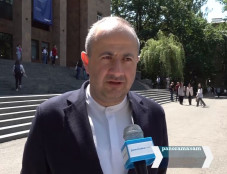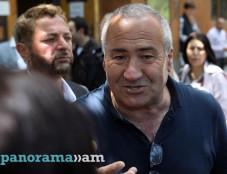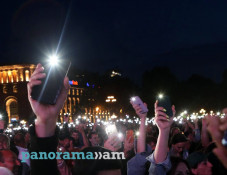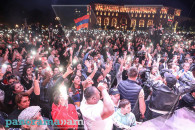
Anna Astvatsaturian Turcotte’s eyewitness account of pogrom of Armenians in Baku, Azerbaijan
On the occasion of the anniversary of pogroms of Armenians in Sumgait (1988) and Baku (1990) Panorama.am presents an interview with Anna Astvatsaturian Turcotte – Armenian-American writer, politician and activist, author of "Nowhere, a Story of Exile", survivor of Baku pogrom that took place against the Armenians in Azerbaijan in late 1980s and early1990s. In the interview Anna Astvatsaturian Turcotte speaks about the awareness of Diaspora Armenians about the Karabakh issue, tells the story of her family which escaped during the pogroms of Armenians in Baku as well as shares her thoughts about the current stage of the Karabakh conflict.
- Mrs. Astvatsaturian Turcotte, you have been advocating for the Nagorno-Karabakh cause in the US for years (spearheading the NKR recognition resolution in Maine, publishing and lecturing on this issue). What can you tell about the dynamic of Diaspora engagement with the Karabakh issue?
- I started actively advocating for the Karabakh issue in the US in 2012. After publishing my book Nowhere, a Story of Exile (based on my childhood diaries in Baku and Yerevan) I felt that there wasn’t enough attention on Nagorno-Karabakh and at that point I decided to do more. I was alarmed to see that so many Diaspora Armenians lacked awareness – they didn’t know for instance that Nagorno-Karabakh Republic was not independent or that it was being targeted by Azerbaijan. But a number of factors brought Karabakh issue to the forefront, amongst them – the recognition of NKR by an increasing number of states, the anti-Armenian resolutions that Azerbaijan brought forth at the state level, increasing aggression by Azerbaijani military, escalation during the April war, as well as the active social media (reporting from frontline), Armenia’s growing tourism sector and other factors.
The April war and the fact that we have an aggressor that targets Armenian borders made many Diaspora Armenians acutely aware of the conflict. I commend the Armenian Diaspora organizations in the US, especially in Washington DC, for bringing the issues to the forefront to our community and engaging the members of Congress on Capitol Hill. This takes daily work and dedication.
I believe that Nagorno-Karabakh should be given at least as much attention as the Armenian Genocide issue in the Diaspora. After all, the Karabakh conflict is ongoing now, and there are victims, many children, that suffer under Azerbaijani aggression today. Almost daily Azerbaijan violates the sovereignty not only of the NKR borders but also of the borders of the Republic of Armenia. This is something we should all be concerned about and continue to bring awareness to it within US and the international community.
- Your family members have witnessed the tragic pages of the Armenian history during the Armenian Genocide and the Baku massacre in Azerbaijan, which you call “Genocide cycle”. Could you tell us more about these experiences?
- My grandfather experienced it twice – in 1915 during the Armenian Genocide and in 1918 during the Armenian massacres in Baku. And then when he had passed away, we experienced it in 1980s and early 1990s in Baku. My immediate family left Baku at the end of 1989 (at that time it was dangerous to walk down the streets as an Armenian). My aunt stayed in Baku in hiding, unable to leave until February, 1990. We lost neighbors, property, our security and really everything. This happened three times in less than 100 years of my family's! And our story is not unique – there were a lot of Armenian families who had come to Baku from Van during the Genocide; and many Genocide survivors who had settled in Baku experienced it several times after. The cycle of genocide is real.
I think the only way to stop it is to be open about our collective history. Turkish and the Azerbaijani community must recognize their history, and learn from Germany on how they addressed the Holocaust. The Armenian Genocide has been covered up for decades and the perpetrators were not brought to justice. Because of this the hatred against Armenians in certain communities continues to resurface because it is the norm. It is not just a matter of political recognition; it is a matter of condemning the perpetrators and bringing them to justice. In both cases of Armenian Genocide and the ethnic cleansing against Armenians in Azerbaijan, this justice didn't take place and the cycle of violence and hatred persists.
- Based on the recollections of your family from pogroms in Azerbaijan could you say that those were planned and organized by Azerbaijan?
- Yes, the pogroms were organized. They knew exactly where we were living. The house we lived in was registered under my mother’s maiden name – Adamian, which was alphabetically first on the list in the city records for that building. I remember how the Azerbaijanis, groups of angry men, came and pounded at our door over and over and our Azerbaijani neighbor told them that the Armenians had all left. We hid in the dark. Throughout 1989 people came into our yard looking for Armenians, and we would hide again. Some Azerbaijani neighbors would tell them the Armenians were here, some would deny it; you never knew whom you could trust. But these groups were organized and knew exactly where the Armenians lived. How else could they know it unless they had the access to this data in advance?
Then they came back in January trying to find my mother again. We had left by then fortunately. They killed our neighbor and severely injuring her mother who later died in Russia. This was my childhood friend’s mother and grandmother. A few months before that as we were leaving, we were begging them to leave and they said it was all right because they were part Azerbaijani and only part Armenian; but they ended up being killed.
- What do you think of the anti-Armenianism and hatred against Armenians that is present today in Azerbaijan, compared to those times?
- Today I don’t think it is any better. I believe it is actually worse. There is a whole generation of Azerbaijani youth that have never seen an Armenian in their life. Because of the official policies the Armenians are villainized in the schoolbooks, on TV and any other media. No Armenians live there anymore. Azerbaijan claims that there are 30,000 Armenians living in Azerbaijan but they can’t show even one Armenian there. The Azerbaijanis believe horrific things about us which are produced by the government. I have been in touch with several people from my childhood who are either Azerbaijani or part Azerbaijani, and it is pretty clear to me that they have been in some way brainwashed by the government propaganda. They remember the good times when the Armenians and the Azerbaijanis lived side by side but they can’t reconcile it with what they have been brainwashed to believe – we must either be vicious and violent animals or their childhood friends. It is confusing to them.
On the other hand, those who have good memories of friendship with us and understand the propaganda piece, they are just too scared to voice any sentiment for peace and reconciliation. And the ones who are younger don’t know the Armenians at all. There is more potential for Armenians and Azerbaijanis to work together outside of Azerbaijan, in Russia for example. But the case of axe-murderer Ramil Safarov tells us that you can’t be sure you won’t be attacked because of your ethnicity.
We always hope for the people of Azerbaijan to wake up and realize that their country is being robbed, that they are being used and in many instances abused – I mean the human rights and civil rights violations by the ruling family (the anti-Armenian propaganda being yet another tool of control). But at the same time the chances that they will take a personal risk to take a stand are pretty minimal.
- Under such conditions do you think it is actually possible to solve the Karabakh conflict in a way that brings together Armenians and Azerbaijanis, given the agenda that the Azerbaijani leadership has towards Armenians?
- I don’t think it is possible. I am the first person to advocate for a peaceful outcome to this conflict, and maybe five years ago I was more optimistic. But today I think that is wishful thinking. Armenian and Artsakh borders must be protected, no matter what they promise at the negotiation table. We must be vigilant and realistic as to what Azerbaijan is doing. They talk with the Armenian government about a peaceful solution to the conflict but then they go back and advocate violence against the Armenians to their own people. It is hard to come to the negotiation table when the leader of Azerbaijan states that “Azerbaijan’s number one enemy are the Armenian people of the world” and that he is going to “reclaim” Yerevan. The Armenian foreign policy is on the right track in terms of bringing to attention all the outrageous things that the government of Azerbaijan says and does. I think the international community is quite aware of this pattern. But it's convenient to brush it under the rug, but we cannot let them. And the diaspora organizations and individuals must use all means necessary to highlight every instance of such outrageous remark or action to the international observers.
For instance, we must pressure the international community to seriously consider using border mechanisms to determine which side is violating the ceasefire. It is only in the best interests of Azerbaijan to escalate the situation. The Armenians already have Karabakh and they are building it – roads, schools, hospitals, factories… Why would they want to enter into another war, or escalate hostilities against its civilians? Within the last 25 years the Nagorno-Karabakh Republic has been independent and democratic and it has been rebuilding, consistently and peacefully – this once again proves it is not just a rogue state but its people demonstrate over and over again their right to self-determination.
January and February of every year we mark the anniversary of the pogroms against Armenians in Azerbaijan. With my work I continue to honor the memory and the continued struggle of the Armenians under Azerbaijani aggression, then and now. With my work I also want to encourage the people of the Diaspora to visit and emotionally invest in Karabakh. I try to visit Artsakh annually, and I am planning on going back this year – I will be presenting my book there which has been translated into Russian. The people of Karabakh are extraordinary and they deserve our time, our help and our respect. And of course the people of Republic of Armenia do too. There are a lot of us in the Diaspora that support their fight for peace, security and stability, and are personally invested in Armenia to thrive, despite all odds.
Newsfeed
Videos






























